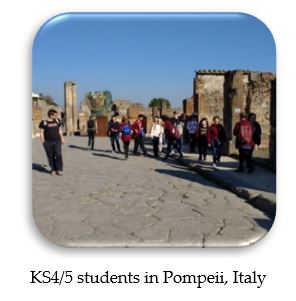Classical Civilisation - Key Stage 5
Students who choose to study Classical Civilisation at Key Stage 5 follow the OCR Classical Civilisation A level course.
Studying Classics allows students the opportunity to study diverse topics and sources, including both literature and visual/material culture, which will inspire and motivate learners to engage further with the classical world. Mrs Scott, our specialist teacher, studied Classical Studies at degree level. She has extensive experience and is eager to share her love of the subject. Her specialism is ancient literature, which is studied widely across the topics of the course.
Course Content:
Classical Civilisation focusses on the civilisations of Greece and Rome, and is a wide-ranging subject involving the study of literature, material culture, ancient thought and ideas, and the ancient historical context. From women in the ancient world, to the study of religious beliefs and ancient acts of intolerance, Classical Civilisation involves interesting discussions that are directly relevant to today’s world. The A level course combines the study of the literature, society, art and culture of classical Greece and Rome.
- The world of the hero: This component will explore both Greek and Roman epic, with the study of Homer’s Odyssey as well as Virgil’s Aeneid, arguably the greatest works of ancient literature. The works of Homer are the foundation of the Western literary canon, and the Greeks themselves considered them the cornerstone of Greek culture. In his Aeneid, Virgil pays homage to Homer, but also to Rome’s first emperor, Augustus. With their unique composition, and exciting tales of gods and heroes, these works of literature form an excellent grounding for exploration of the classical world.
- Culture and the arts (Greek art): The 6th– 4th centuries BC was a period of great change in the Greek world, and this is reflected in the art which was produced. Students will have the opportunity to explore and engage with a range of the visual arts produced by the Greeks in 6th– 4th centuries BC, including freestanding sculpture, architectural sculpture and vase-painting. Students will be able to appreciate the profound effect Greek art has had on the art of later periods. This component will hone learners’ visual and analytical skills, as well as develop their ability to offer critical analysis.
- Beliefs and ideas (Love and relationships): Ideas about love and relationships are key aspects of the literature, thoughts, and ethics of any society. This component offers the opportunity for students to recognise and relate to the passions, frustrations and delights of love in the ancient world. The ethical questions raised by these ideas continue to be wrestled over by successive generations and this unit will generate interesting and important discussions about love, desire, sexuality and the institution of marriage. Poets and philosophers studied include Seneca, Plato, Ovid and Sappho – one of the very few female poets of the ancient world.
Assessment:
Students will sit 3 exams for each component of the A level:
- The world of the hero: a 2 hour 20 minute written examination worth 40% of the final grade
- Culture and the arts: a 1 hour 45 minute written examination worth 30% of the final grade
- Beliefs and Ideas: a 1 hour 45 minute written examination worth 30% of the final grade
Classics combines well with most humanities subjects and English Literature. It develops the communication of ideas and an understanding of the views of others, analysis and interpretation of evidence and investigative research skills. The study of classical antiquity will give students a better understanding of our own identities within the global community and of how the world has become what it is today. Employers therefore look favourably on these skills, as they are adaptable to almost any line of work. Occupations such as law, journalism, politics and writing are just some of the areas where Classics is particularly important. It could be useful in any workplace due to the development of analytical and communication skills.
Curriculum Implementation
Click here to view the curriculum implementation overview for Classical Civilisation at Key Stage 5.
Curriculum Timelines
Click here to view the curriculum timeline for Classical Civilisation at Key Stage 5.
CUrriculum Learning Journey
Click here to view the learning journey for Classical Civilisation at Key Stage 5.
Click here to return to the Classical Civilisation page.

